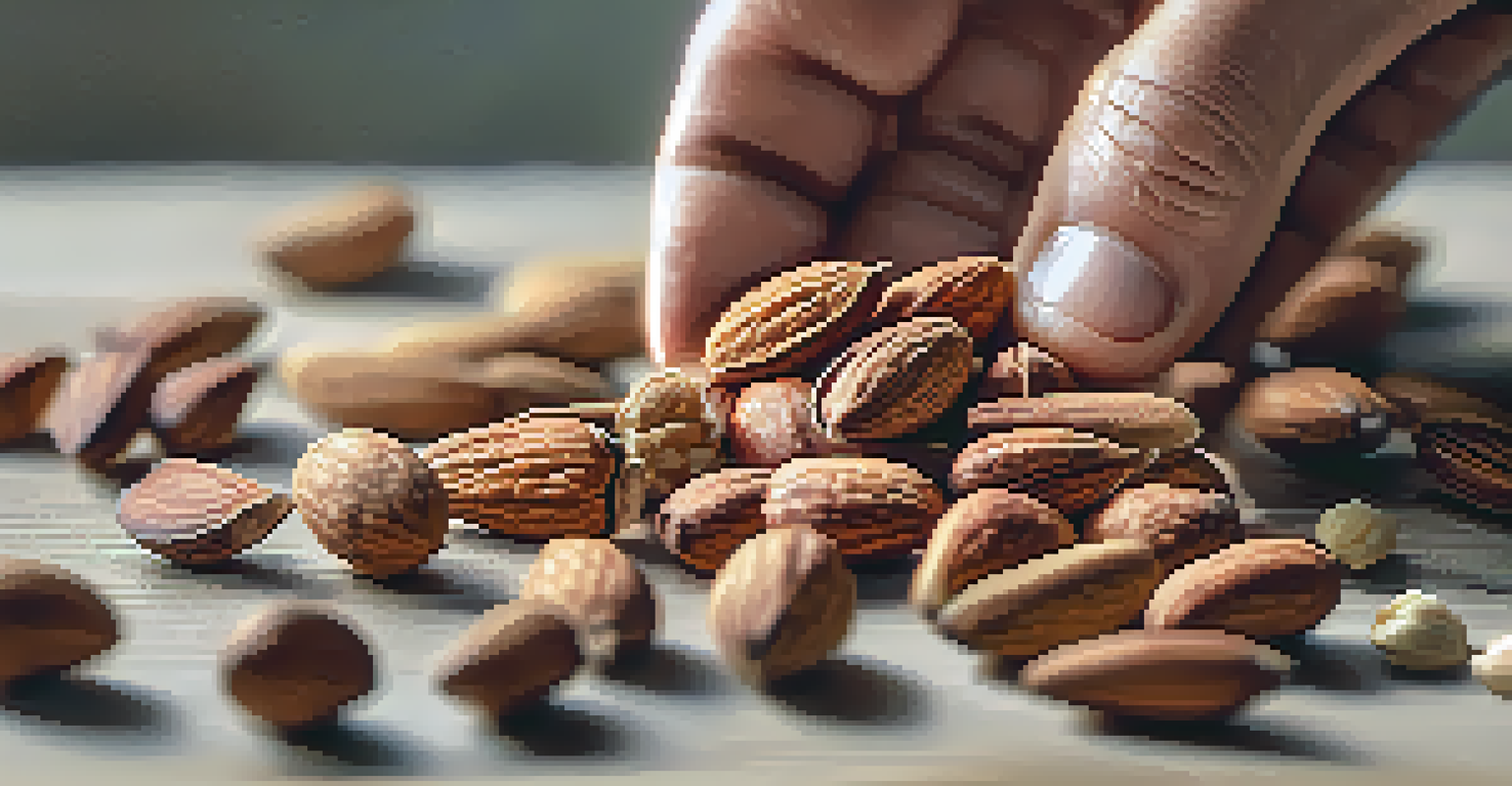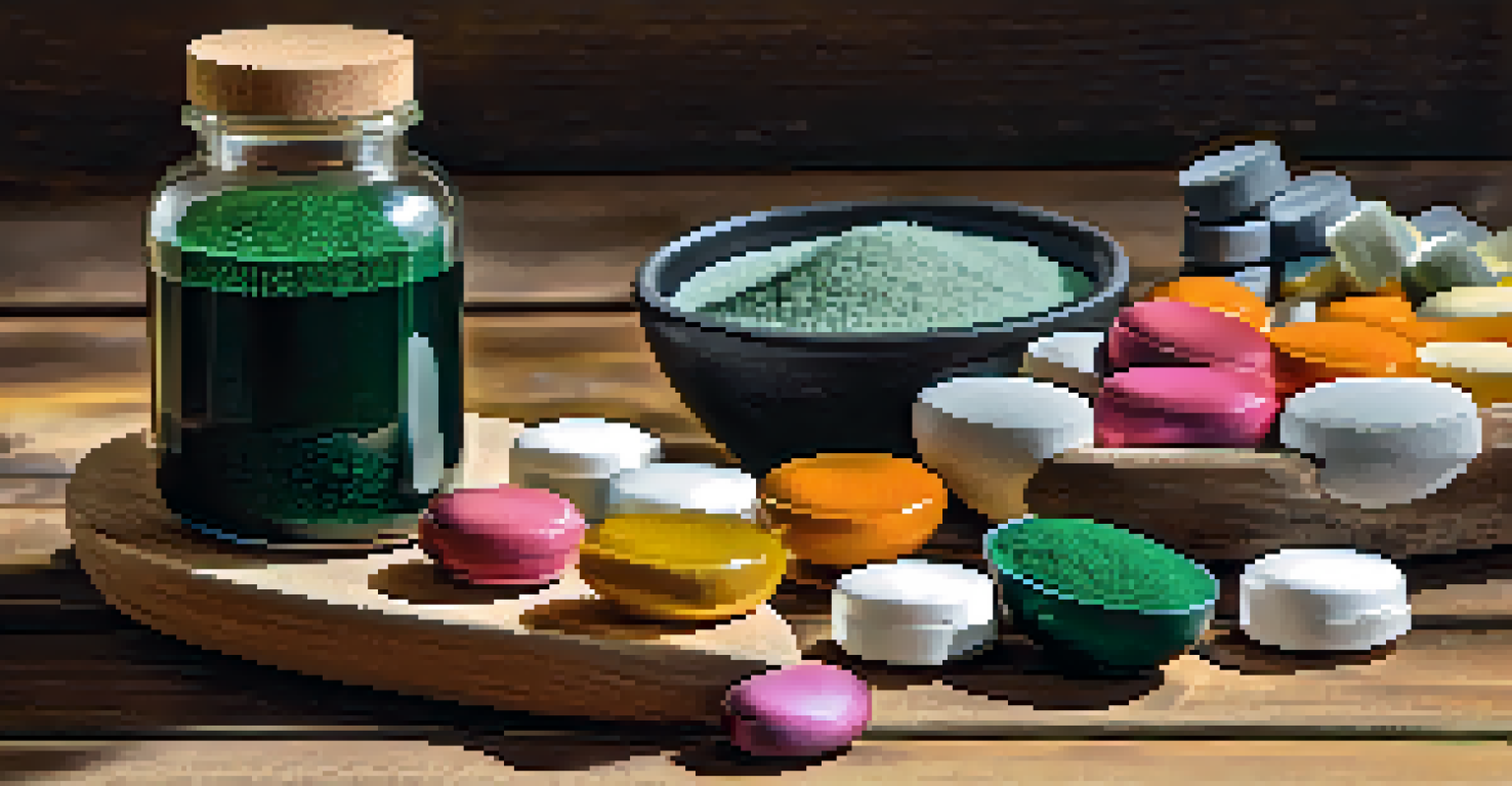Vitamins and Minerals: Essential Nutrients for Bodybuilders

Understanding the Role of Vitamins in Bodybuilding
Vitamins play a crucial role in energy production and recovery for bodybuilders. They help convert food into energy and support muscle growth and repair. For instance, vitamin B complex is vital for metabolism and can enhance your workout performance.
Let food be thy medicine and medicine be thy food.
In addition to energy production, vitamins also boost your immune system, helping you stay healthy and training consistently. This is particularly important for bodybuilders, who often push their bodies to the limit. A strong immune system helps prevent illness and keeps you on track with your fitness goals.
Furthermore, vitamins like vitamin D and vitamin C have been shown to support muscle function and reduce inflammation. Incorporating a variety of vitamins into your diet ensures that your body functions optimally, allowing you to make the most of your training sessions.
The Importance of Minerals for Muscle Function
Minerals are essential for various bodily functions, including muscle contraction and nerve signaling. Key minerals like calcium and magnesium are particularly important for bodybuilders, as they help prevent cramps and maintain muscle function during intense workouts. Without adequate minerals, your performance can suffer.

Electrolytes, which include sodium, potassium, and chloride, are also crucial for hydration and muscle function. During exercise, you lose electrolytes through sweat, and replenishing them is vital to avoid fatigue and cramping. A balanced intake of these minerals can lead to improved endurance and recovery times.
Vitamins Boost Energy and Recovery
Vitamins are essential for energy production, immune support, and muscle recovery in bodybuilders.
Additionally, trace minerals like zinc and iron contribute to energy production and oxygen transport in the body. Ensuring you have sufficient levels of these minerals can significantly enhance your overall athletic performance and recovery, making them essential for any bodybuilder.
Top Vitamins for Bodybuilders to Include in Your Diet
When it comes to vitamins, vitamin D is a standout for bodybuilders, as it aids in muscle growth and strength. You can find it in foods like fatty fish, egg yolks, and fortified dairy products. If you’re not getting enough sun exposure, consider a supplement to ensure optimal levels.
The groundwork of all happiness is health.
Another important vitamin is vitamin E, known for its antioxidant properties. It helps combat oxidative stress created during intense workouts, potentially leading to better recovery. Foods rich in vitamin E include nuts, seeds, and green leafy vegetables, making it easy to incorporate into your meals.
Lastly, don't overlook vitamin C, which not only supports your immune system but also aids in collagen production for joint health. Citrus fruits, strawberries, and bell peppers are excellent sources. Including these vitamins in your diet can help you build muscle while maintaining overall health.
Essential Minerals Every Bodybuilder Should Monitor
Calcium is fundamental for strong bones and muscle contractions, making it essential for bodybuilders. Dairy products, leafy greens, and fortified alternatives are great sources. Keeping your calcium levels in check can help prevent injuries and enhance performance.
Magnesium, another crucial mineral, helps with muscle relaxation and recovery. It can be found in foods like nuts, seeds, and whole grains. A diet rich in magnesium not only supports your muscles but also aids in energy production, making it a must for serious athletes.
Minerals Support Muscle Function
Key minerals like calcium, magnesium, and iron are crucial for muscle contraction, hydration, and overall performance.
Lastly, iron is vital for oxygen transport in the blood, which is crucial during those heavy lifts. Red meat, beans, and spinach are excellent sources of iron. Monitoring and maintaining adequate iron levels can lead to improved endurance and overall workout performance.
How to Get Enough Vitamins and Minerals Naturally
Eating a balanced diet rich in whole foods is the best way to meet your vitamin and mineral needs. Focus on a variety of fruits, vegetables, whole grains, lean proteins, and healthy fats. This diverse diet ensures you’re not missing out on essential nutrients that are vital for your bodybuilding goals.
Consider meal prepping to make it easier to stick to a nutrient-rich diet. By planning your meals in advance, you can ensure that you're including a wide variety of foods that provide the necessary vitamins and minerals. This approach saves time and helps you resist the temptation of unhealthy options.
Lastly, don’t forget the importance of hydration. Drinking enough water is essential for nutrient absorption and overall performance. Aim to drink at least 8-10 glasses of water daily, and increase your intake during workouts to keep your body functioning at its best.
Supplements: When to Consider Them
While a balanced diet should provide most of your vitamins and minerals, some bodybuilders may need supplements to fill gaps. For instance, if you follow a strict vegan diet, you might need to consider vitamin B12 and iron supplements, as these can be harder to obtain from plant sources alone.
Additionally, athletes with increased nutrient needs due to intense training may benefit from a multivitamin. This can help ensure you’re covering your nutritional bases, especially during periods of heavy training or recovery. Always consult with a healthcare professional before starting any supplements.
Whole Foods for Nutrient Needs
A balanced diet rich in whole foods is the best way for bodybuilders to meet their vitamin and mineral requirements naturally.
Remember, supplements should complement your diet, not replace it. They can be a helpful addition, but focusing on whole, nutrient-dense foods should always be your primary strategy for achieving optimal health and performance.
Common Deficiencies to Watch Out For in Bodybuilders
Despite best efforts, bodybuilders can be prone to certain nutrient deficiencies. Vitamin D deficiency is common, especially in those who train indoors or live in areas with limited sunlight. Regularly monitoring your levels and adjusting your diet or supplements can help maintain optimal health.
Iron deficiency is another concern for bodybuilders, particularly among women. Symptoms like fatigue and decreased performance can indicate low iron levels. Incorporating iron-rich foods and possibly speaking with a healthcare provider about supplementation can be beneficial.

Lastly, magnesium deficiency can lead to muscle cramps and fatigue, which are detrimental to a bodybuilder's training. Foods like nuts, seeds, and whole grains can help, but keeping an eye on your intake is essential for maintaining peak performance.